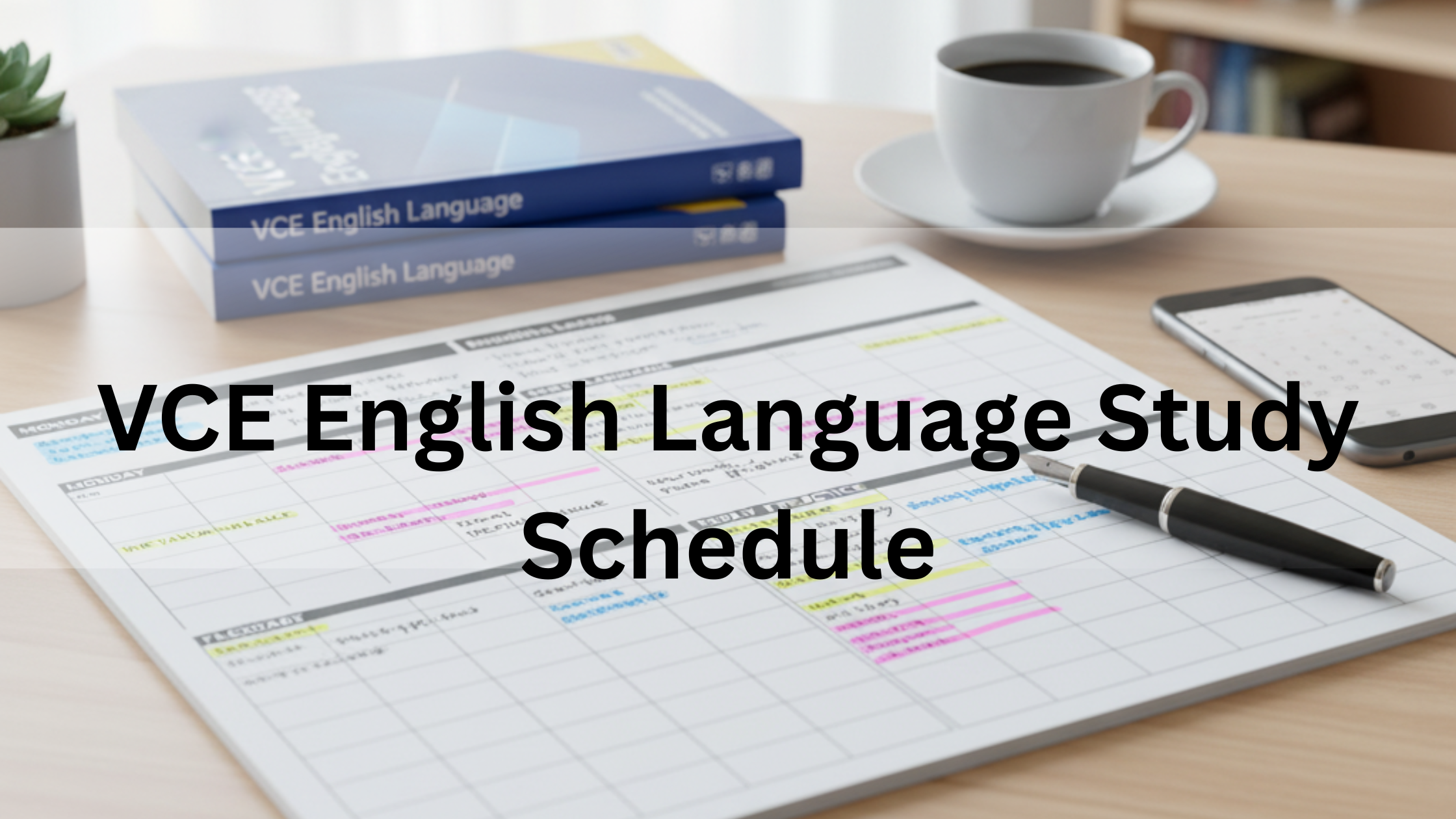How to Create a VCE English Language Study Schedule
Do you ever feel like there simply aren’t enough hours in the day to stay on top of your VCE English Language workload? Between SACs, essays, and revision for other subjects, it’s easy to fall into procrastination or last-minute cramming. The outcome? Stress, poor time management, and uneven results.
The good news is that a structured VCE English Language study plan can make a huge difference. With a clear revision timetable, realistic weekly goals, and a consistent practice routine, you’ll not only stay organised but also walk into assessments and the final exam with confidence.
This guide walks you through building a personalised study schedule step by step, drawing on proven study techniques, examiner advice, and practical examples.
Why a Study Schedule Matters
Think about two students:
Student A keeps a weekly timetable, revises metalanguage every Monday, writes a practice essay each weekend, and reflects on progress.
Student B crams the night before SACs, skips practice essays, and constantly feels behind.
Who do you think walks into the exam feeling calmer?
A structured study schedule helps you:
✅ Reduce last-minute panic
✅ Improve time management skills
✅ Build revision into a sustainable practice routine
✅ Set achievable weekly goals
✅ Track progress and adjust when needed
In short: a timetable doesn’t restrict your freedom — it frees you from stress.
Step-by-Step Guide to Building a VCE English Language Study Plan
1. Map Out Topics and Content
Start by identifying what you need to revise. Key areas for English Language include:
Metalanguage – phonology, syntax, semantics, discourse
Analytical commentary – register, tenor, function, purpose
Essay writing – argument structure, contemporary examples, linguists
Short-answer responses – concise analysis with evidence
Tip: Review the VCE English Language study design and your past SACs to see where your strengths and weaknesses lie.
2. Estimate Your Available Study Time
Most Year 12 students should aim for 20–24 hours of study each week across all subjects.
For English Language, aim for 4–6 hours per week.
Balance this with your other commitments — school, part-time work, sport, or downtime. Remember: consistency matters more than endless hours.
3. Prioritise Weaknesses
Not every topic needs the same amount of time. Use feedback from SACs or teachers to target your weaker areas.
Weak in metalanguage? → spend extra time on flashcards and application.
Struggling with essays? → practise unpacking prompts and planning under timed conditions.
Confident in one area? → keep it fresh with light revision but shift your main focus to gaps.
Example: If you’re strong at essay planning but weaker in discourse analysis, spend an extra 30 minutes each week annotating transcripts for discourse features.
4. Design a Weekly Revision Timetable
Now, turn your plan into a visual revision timetable.
Use SMART goals (Specific, Measurable, Achievable, Relevant, Time-bound).
Break tasks into 45–60 minute study blocks with short breaks.
Here’s a sample:
| Day | Time Block | Focus Area | Goal Example |
|---|---|---|---|
| Monday | 4–5 PM | Metalanguage flashcards | Revise 15 terms + write 1 short answer |
| Wednesday | 4–5:30 PM | Text analysis + essay | Annotate transcript + plan essay |
| Friday | 5–6 PM | Writing practice | Write 2 TEEL paragraphs |
| Saturday | 10–12 PM | Full timed essay | Complete 1 essay + self-review |
Tip: Print your timetable or use Google Calendar. Seeing it helps you stay accountable.
5. Create a Practice Routine
A good practice routine should balance all exam sections:
Essay writing → 1 timed essay per week
Short-answer practice → 2–3 questions weekly
Metalanguage → daily flashcards or mini quizzes
Analytical commentary → 1 paragraph analysis every two days
Mix it up to stay engaged and avoid burnout.
6. Review and Reflect Weekly
At the end of each week, check in with yourself:
Did I complete my weekly goals?
Where did I spend too much (or too little) time?
What needs adjusting for next week?
Keep a simple checklist or progress journal so you can see your improvement over time.
Study Techniques for English Language
Here are some proven strategies for VCE success:
TEEL structure for essays → clear topic sentences and focused analysis.
Metalanguage revision → use flashcards, mnemonics, or group quizzes.
Exam practice → attempt past VCAA exam papers under timed conditions.
Peer learning → swap essays or commentaries and mark against criteria.
For more, explore our free VCE English Language resources.
Tips to Stay Consistent
Use the Pomodoro method: 25 minutes study + 5 minutes break.
Use visual planners: whiteboards, Google Calendar, or colour-coded timetables.
Schedule downtime: rest prevents burnout.
Celebrate small wins: reward yourself when you hit a weekly goal.
Stay flexible: adjust if something isn’t working.
Want more? Check out our [Metalanguage Guide], [Essay Writing Tips], and [ free VCE English Language resources] to supercharge your study plan
Conclusion
Creating a VCE English Language study plan is one of the smartest decisions you can make. A clear timetable, consistent practice routine, and achievable weekly goals will give you structure, reduce stress, and boost your exam confidence.
Remember: success = consistency, not cramming.

